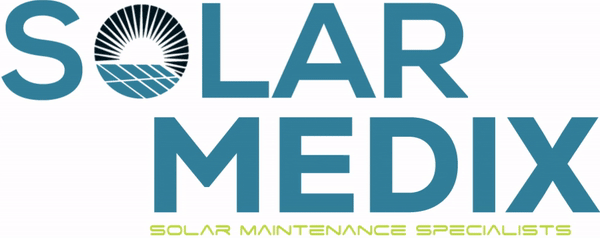As New Jersey is working towards cleaner forms of energy, some business owners wonder if switching to commercial solar energy is worth it. Solar power has the added advantage of reducing electric bills while helping businesses market in a more sustainable way.
In conjunction with the tax incentives that the state offers and the return on investment from solar energy, commercial solar energy systems in New Jersey are a good investment for businesses.

Importance of Solar Energy in New Jersey
New Jersey has been aggressive in renewable energy, with a considerable emphasis on solar power. The legislation and policies adopted in the state provide a good ground for companies to install solar systems, contributing to the state’s aggressive renewable energy targets.
The solar energy option provides industries with the opportunity to play their part in preserving the environment while positioning themselves as green companies.
- The state is one of the best in the country in terms of installed solar capacity.
- Incentives such as the Solar Renewable Energy Credits make going solar a financially attractive investment.
- As the world becomes more environmentally conscious, the demand for renewable energy increases.
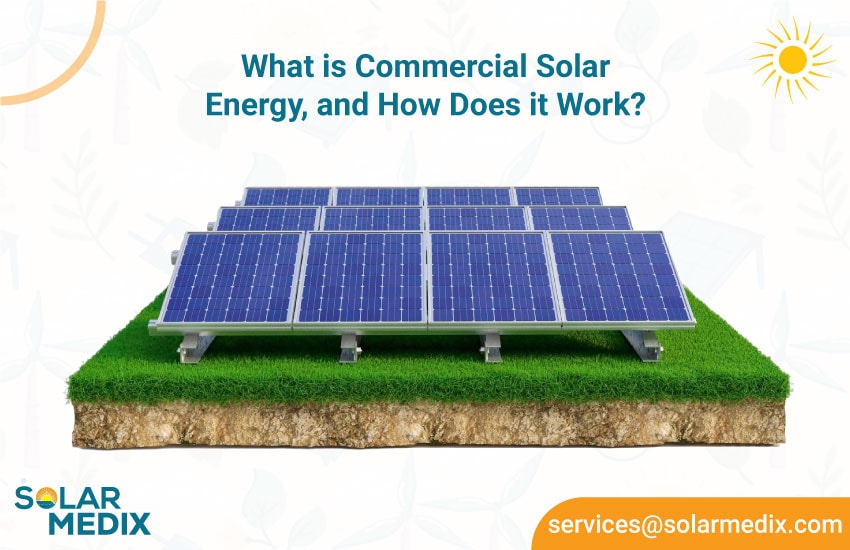
What is Commercial Solar Energy, and How Does it Work?
In the case of commercial solar energy, the PV panels are installed on commercial premises, such as office buildings, warehouses, as well as factories.
The panels harness sunlight and transform it into electrical energy, which is either used by the business or excess electricity is supplied back to the power grid.
How commercial solar works:
- The solar panel helps to absorb the sunlight and changes this into electricity in the form of direct current electricity.
- An inverter is responsible for taking the DC power and converting it to an AC power supply, which is used in most electrical circuitry.
- Excess electricity can be credited to the business’s monthly bill if the solar PV system is connected to the main electricity network with net metering.
For more detailed information about commercial solar panels and things, you must know before installing them, consider reading our blog: “6 Things to Know Before Getting a Commercial Solar System”
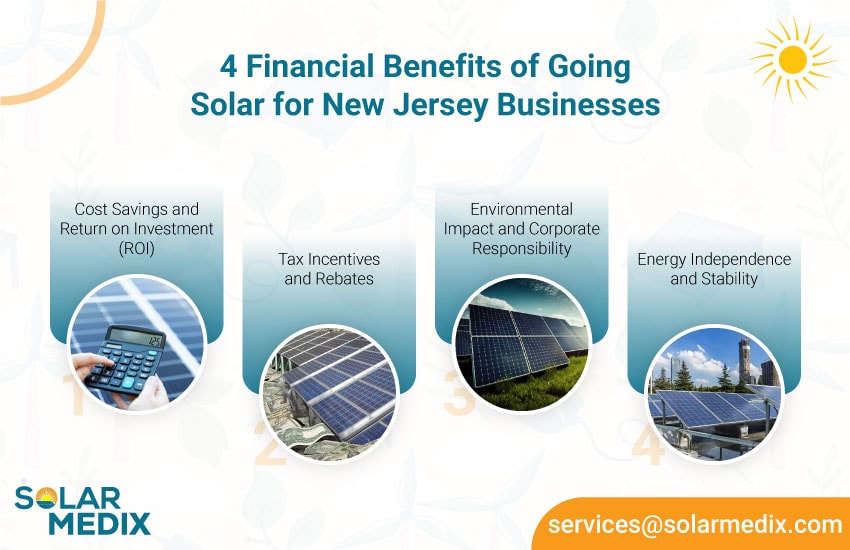
4 Financial Benefits of Going Solar for New Jersey Businesses
When it comes to the financial benefits for New Jersey businesses for going solar, they can be divided into the following categories:
- Cost Savings and Return on Investment (ROI)
- Tax Incentives and Rebates
- Environmental Impact and Corporate Responsibility
- Energy Independence and Stability
1. Cost Savings and Return on Investment (ROI)
Cost savings are the most notable benefit that comes to the fore right after the installation of solar panels.
Installation of solar energy systems means lower electricity bills and a high return on investment, especially for business endeavors where most businesses can recover most of their initial expenses in a few years.
- Money saved on the monthly utility fee is considerable.
- The return on investment can be achieved in as little as 5-7 years.
- Potential to save up to 75% on energy costs over the lifespan of the system
You can also read our blog “Lifespan of Solar Panels: When to Repair vs When to Replace?” if you are concerned about the lifespan and longevity of solar panels.
2. Tax Incentives and Rebates
There are many financial benefits and incentives that help lower the capital cost of commercial solar installations in New Jersey. The federal investment tax credit (ITC) enables businesses to reduce 30 percent of the expenditure incurred in the installation of solar energy systems.
- Federal Investment Tax Credit (30%)
- Solar Renewable Energy Certificates (SREC) program in New Jersey
- Accelerated depreciation through the Modified Accelerated Cost-Recovery System (MACRS)
3. Environmental Impact and Corporate Responsibility
Changing to solar energy not only increases the profitability of a business but also helps the business reduce its carbon footprint.
There is a shift in consumer preferences toward purchasing from eco-friendly firms, so solar energy is an effective tool for improving the image of a company.
- Reduction of carbon and greenhouse gas emissions
- Positive public relations and brand loyalty
- Meeting corporate social responsibility (CSR) goals
4. Energy Independence and Stability
Due to the use of solar energy, it is possible to avoid ever-changing energy prices. Thus, a certain level of stability can be achieved with regard to energy costs.
Likewise, businesses with solar power systems can back up during outages and operate with the help of energy storage.
- Protection from rising utility rates
- Increased energy security with on-site power generation
- Ability to operate during power outages with battery storage systems
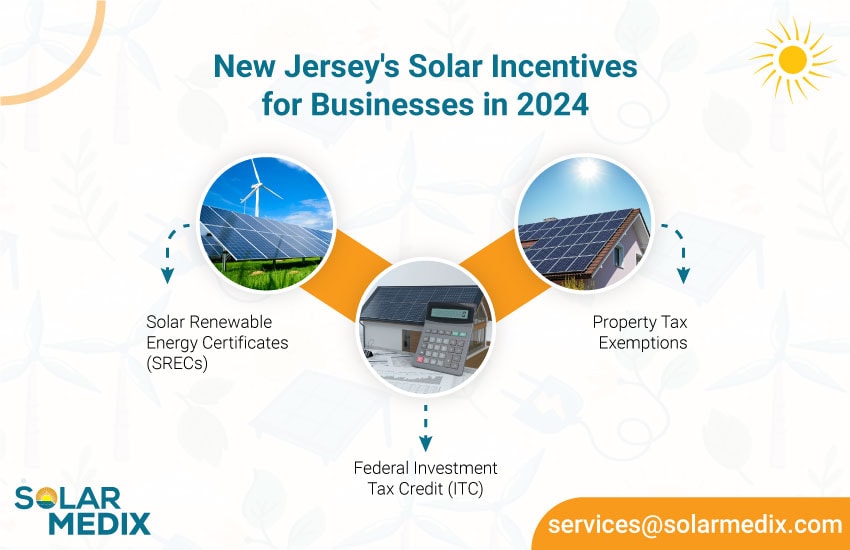
New Jersey’s Solar Incentives for Businesses in 2024
The government of New Jersey still promotes renewable energy sources using favorable utility rebates and incentives for businesses.
This, in turn, allows businesses to lower their initial financial expenditures installing commercial solar systems.
2024 Incentives Include:
- Solar Renewable Energy Certificates (SRECs): SRECs are issued to businesses for every megawatt-hour of solar energy generation.
- Federal Investment Tax Credit (ITC): Investment Tax Credit ITC provides 30% of the investment back from the IRS for all solar panels installed and in operation before 2024.
- Property Tax Exemptions: New Jersey allows businesses to exclude the added value of a solar system from property taxes.
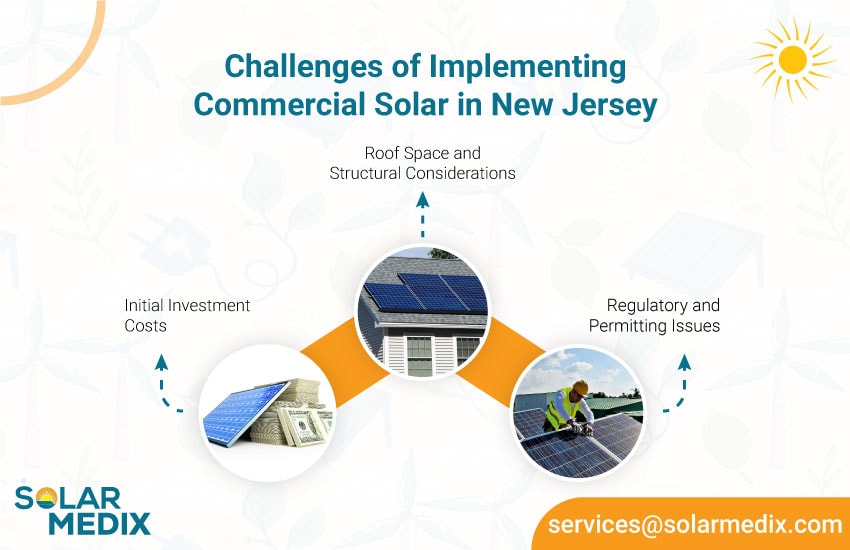
Challenges of Implementing Commercial Solar in New Jersey
- Initial Investment Costs
- Roof Space and Structural Considerations
- Regulatory and Permitting Issues
1. Initial Investment Costs
Though solar energy systems are cost-effective in the long run, the first cost bears a heavy burden. In such instances, strategies such as power purchase agreements (PPAs) and solar leases effectively reduce the level of the first payments.
- High initial installation costs
- Availability of financing options like PPAs and solar leases
- Potential for grants and loans to mitigate upfront expenses
2. Roof Space and Structural Considerations
The area of the roof, as well as the physical condition, would affect your ability to install the solar power system onto your building. It is worth making sure that the roofing system is adequate and the area available for the installation of the solar panels is also sufficient.
- Adequate roof space for panels
- Roof strength and age considerations
- Alternative options, such as ground-mounted or solar carport installations
For more information about roof space and structural considerations, consider reading our blog “Solar Panels Roof Requirements – How to Get Your Roof Ready for Solar Panels Re-Installation”
3. Regulatory and Permitting Issues
Permits and zoning laws and regulations in the State of New Jersey present certain challenges to most individuals. You may consider working with experienced solar installers like Solar Medix to avoid the struggles.
- Compliance with local zoning and building codes
- Securing permits from local authorities
- Engaging with utility companies for net metering agreements
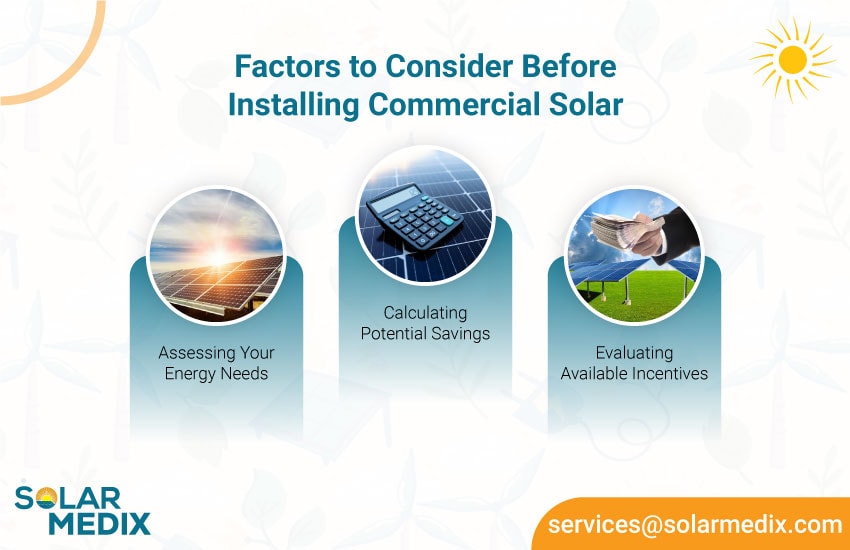
Factors to Consider Before Installing Commercial Solar
- Assessing Your Energy Needs
- Calculating Potential Savings
- Evaluating Available Incentives
1. Assessing Your Energy Needs
Before you put in a solar system, it is wise to look into the electricity usage of your business. This helps inform the size of the solar array to be installed to efficiently provide for your energy needs.
- Conducting energy audit
- Identify peak energy usage times
- Consider future energy needs as your business grows
2. Calculating Potential Savings
Estimating your potential savings will give you a clear picture of how much you can reduce energy costs over time.
- Compare current utility bills with potential solar savings
- Use solar calculators or work with professionals to estimate savings
- Consider long-term energy price trends
3. Evaluating Available Incentives
Maximizing financial incentives can significantly reduce your upfront costs, so it’s crucial to research available federal and state rebates.
- Understand available tax credits and rebates
- Review financing options and eligibility for SRECs
- Plan for depreciation and other tax benefits

Get Expert Commercial Solar Services in NJ from Solar Medix
Solar Medix offers comprehensive services to help New Jersey businesses optimize their solar investments. From initial consultations to ongoing maintenance, Solar Medix ensures that your solar system remains efficient and reliable. Solar Medix’s services include,
- Custom Solar Solutions
- Operations & Maintenance (O&M) Services
- Solar Monitoring and Support
1. Custom Solar Solutions
Solar Medix designs custom solar solutions tailored to your business’s energy needs, ensuring optimal efficiency and maximum savings.
- Personalized solar system design
- Energy storage and battery solutions
- Turnkey installation services
2. Operations & Maintenance (O&M) Services
Maintaining your solar system well-maintained is necessary for peak operational efficiency. Solar Medix specializes in O&M services management to always keep your system working at its best performance.
- Preventative maintenance checks
- Solar panel cleaning and system diagnostics
- Repairs and replacement services
3. Solar Monitoring and Support
Solar Medix offers comprehensive monitoring solutions to track your solar system’s performance and ensure immediate detection of any issues.
- 24/7 monitoring services
- Real-time performance tracking
- Fast response to system malfunctions
Frequently Asked Questions (FAQs)
Depending on the system size and energy usage, you can save maximum energy expenses up to 75%.
You can determine the ROI by comparing the investment spent on the installation to the yearly energy cost savings, which can be converted to more incentives and rebates.
Yes, the roof must have adequate area, and construction-wise, it should be strong enough to hold solar structures. There are ground-mounted or carport options available as well.
Approval durations vary, but Solar Medix can help you get through the permitting process efficiently, which usually takes a few months.
Solar Medix offers monitoring and O&M services to ensure your system operates at peak performance.
Solar Medix provides and integrates its solar installations with battery storage, and designs the system based on your company’s energy needs.
Solar panels can capture solar energy, store it, and use it later to run systems even in case of main power outage.
